| Reviews & Columns |
|
Reviews DVD TV on DVD Blu-ray 4K UHD International DVDs In Theaters Reviews by Studio Video Games Features Collector Series DVDs Easter Egg Database Interviews DVD Talk Radio Feature Articles Columns Anime Talk DVD Savant Horror DVDs The M.O.D. Squad Art House HD Talk Silent DVD
|
DVD Talk Forum |
|
|
| Resources |
|
DVD Price Search Customer Service #'s RCE Info Links |
|
Columns
|
|
|
Attenberg
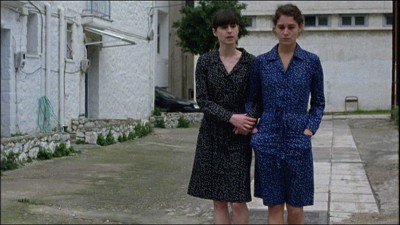
"It's soothing, all this uniformity."
Marina (Ariane Labed) is a late bloomer, but she's blooming with more self-conscious, methodical control than has her best friend and confidante, Bella (Evangelia Randou), who has apparently been in full, free-loving flower for quite some time and is Marina's mentor (and sometime tentative co-experimenter) in all matters sexual, be they physical or philosophical. These early-twentysomething girlfriends are stuck together in a mid-sized Greek town, resigned wage slaves working dull jobs. (Bella as a waitress at what looks to be the bar of a rundown resort, Marina as a secretary/driver at some huge industrial plant on the outskirts whose product or purpose we never learn, though it looks designed to process some natural resource or other.) Making matters worse, Marina's architect father, Spyros (Vangelis Mourikis), a widower who has become a life raft of sorts to his motherless daughter, is now sinking, terminally ill in late middle age and dissatisfied, as a former idealist whose hands literally helped designed the world that exists around them, with the banal "petit bourgeois" Greece he and his generation are leaving to Marina and hers. Spyros is trying his best, as is Bella, to help the cerebral, overly deliberative and verbal Marina through her sexual ambivalence, her over-studied tremulousness in the face of the physical and biological. Marina explains to both that she is resistant to initiation into a flesh-and-blood part of growing up that she's both fascinated with and repelled by, and from which, like her father's impending, inevitable death, there will be no turning back. So, Attenberg is a coming-of-age story, but that's not nearly an adequate description: it's one of the most intelligently, boldly, and uniquely rendered comings of age you've ever seen on film.
Without meaning to be too reductive (because these national-cinema "movements" are more just convenient categories -- descriptions of filmmakers who share a nationality and thus often have some natural overlap to their individual thematics and styles -- than they are absolutely valid and applicable), it makes perfect sense, judging from the film's most salient attributes, that it comes from the same time, place, and film industry that almost concurrently brought forth Giorgos Lanthimos's startlingly original, accomplished Dogtooth (2009 to Attenberg's 2010): it plays fast and loose with its assured realism, is possessed of a stark and antisentimental frankness, and intertwines its dramatic/narrative realism with the abstract and the allegorical to the point that they become indistinguishable. It hardly seems coincidental or insignificant that Lanthimos himself figures prominently here as an actor, playing a major supporting role as the visiting engineer Marina is assigned to chauffeur, whom she designates as her gauge for any enthusiasm for or enjoyment in sexual commingling that may be hiding itself in what sometimes feels to her like her asexuality.
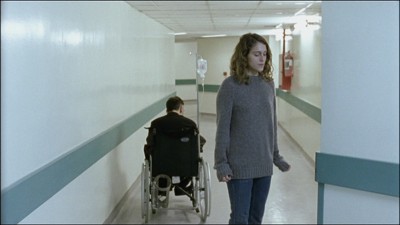
Attenberg's auteur, Athina Rachel Tsangari, has come up with something more ruefully funny and relaxed, much less a nightmarish fable, than Dogtooth, but it notably shares with Lanthimos's film an overarching adherence to an observational, "outside" aesthetic that deemphasizes psychological motivations and other familiar, individuating builders of character in drama. What any character in Attenberg might say or think of herself is just one behavior to be taken into account along with what we actually see her do as her interactions and silent routines play out. The film's observational quality also encompasses a disorientingly heightened attentiveness to the fact that the world surrounding Marina, Bella, Spyros, and the engineer dwarfs and decenters them. The roadways, the symmetrical pattern of the town's clean business buildings and dwellings with their anonymous facades, the sterile and impersonal hospital where Marina takes her father for treatments, the too-spacious, empty, smokestack-and-steel works at Marina's site of employment, the inscrutable purpose of which is less important to the film than the aura of powerful, mindlessly practical efficiency to which every human figure appears subsumed -- these are things that exists beyond and well apart from them, something with which they have no connection. It's the same industrialized/urban alienation (and a comparably stunning visual execution of it) Antonioni evoked in his explorations of L'Eclisse's and Red Desert's strange (in)human environments, but wherever she picked it up, Tsangari's intuition for creating a film's world and attaining its tone through framing and composition (aided by Dogtooth cinematographer Thimios Bakatakis's disarmingly unassuming, naturalistic yet perfectly precise use of light) is impressive.
If those captivatingly subtle, evocative shots of Marina, Bella, and Spyros against their backdrop of bland, disconnected, stifling modernity owe something to Antonioni, Attenberg's dispassionate, this-is-what-it-is framing and durations (whether at typically medium-long-shot range or in less-frequent close-ups) when it comes to the sex scenes necessary to Marina's story recall Catherine Breillat's "entomological" films (Fat Girl, Anatomy of Hell, etc.). They're explicit studies of human mating habits that you'd be hard pressed to find erotic, but whose clinical quality is not, as it is sometimes characterized, cruel (unless the atypical refusal to indulge the porn potential of graphic sex strikes you as punitive), but truly curious; in this case, Tsangari's and Bakatakis's camera takes the same approach as the more-curious-than-excited Marina herself to her sexual encounters with Lanthimos's character, treating them as a sort of experimental investigation. Marina is just as bluntly methodical when it comes to taking the perhaps even more difficult step into adulthood of acknowledging her father as a sexual being; after joking with him about never wanting to think of him as someone with a penis, she calls what she's long jealously suspected is an attraction between Bella and Spyros out into the open, asking her friend to grant her father one last physical encounter before he leaves them.
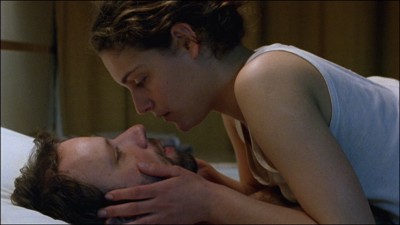
The film's quizzical title, in fact, has everything to do with its level, unromantic, unblinking gaze at the most common, universal human passion and act thereof: it comes from Marina's broken-English mispronunciation of Sir David Attenborough, a British TV personality whose long string of personable nature documentaries she loves, not least for their investigative approach to the behaviors and rituals of the animal kingdom, which she has evidently adopted for herself and her own life. But the way that Attenborough comes up is something else altogether: an additional layer underlying the film's Antonioni-indebted exterior-set action and Breillat-esque interiors consists of heightened-reality interludes (it's during one of these that Bella gently corrects Marina's pronunciation of "Attenborough" as "Attenberg") with Bella and Maria walking arm in arm at a slow, rhythmic pace down another bland residential alleyway, dressed in gorgeously matched/coordinated yin-yang dresses. At these moments the young women philosophize and share dreams (the walks could, in fact, be a dream); calmly relating their thoughts on sex; and, most lovely and absurd, doing perfectly choreographed and executed little dances together. (Their look and dance moves seem to have something retro/nostalgic to do with Marina's love of '60s French pop chanteuse Françoise Hardy, whose innocent longing is seemingly mismatched to her equally veneration of Suicide, a late-'70s/early-postpunk NYC synth-grime band; but the two acts making an unusually apt pop-music soundtrack signifier for Marina's strangely compelling, synthetic-feeling reality contrasting with her wish for elegant, beautifully and simply expressive, asexual girlhood). This dressed-up promenading and frolicking is obviously some parallel world to the film's reality; it's not at all what the friends' contentious, rivalrous, teasing (if steadfast) relationship looks like in the film's other sections, but it is a physical manifestation, perhaps, of what their presence in each other's lives feels like and means to Marina (or Bella, or both). These moments are fanciful, whimsical, lovely, and free in a way that sets them off very distinctly from the rest of the film, but they're edited in as if they're just another step in the narrative progression. It's thus structurally an effective expander of what the film is up to, but it first captures our attention simply by being a striking image, both in its iconographic presentation and look (one wonders if the girls-side-by-side image Stanley Kubrick gave us, by way of Diane Arbus, in The Shining made some sort of especially deep impression on the new Greek school of cinema, as a similarly resonant pairing of two young female characters also occurs prominently in Dogtooth) as well as in the way it moves, in a steadily leading track that pulls the two figures toward us, from a distance and at a pace nearly identical to that of a similar, also recurring shot in Fassbinder's Katzelmacher. The intended effect of these interludes here is all Tsangari's own, though: they're treated like connecting, transitional shots, but in their forthrightly abstract/antirealist contrast to the scenes they bridge, they're like a glimpse into some secret subterranean (or even subconscious) tunnel that underlies and networks together the placidly self-contained and alienating "reality" conveyed so solidly and sharply in the film's more realistic stretches -- a conduit that facilitates the flow, unseen and never surfacing but unfettered and far-reaching, of all the spontaneous play, affection, and unproductive, unmediated, directly expressed feeling for which the film's real world has no use or place.
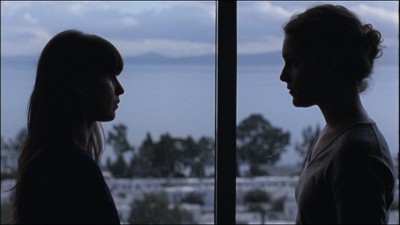
Despite Tsangari's evident influences, Attenberg is no pastiche, nor even an homage; it's the director's folding together of some fine, well-chosen cinematic ingredients into her own brand-new concoction, a fully integrated accomplishment that knows exactly what it's doing at all times, even when it's throwing us off with its odd yet invigorating blend of surrealism and starkness. There's a way of thinking about art that says its purpose is to take the world we (think we) know and defamiliarize it, to show us just how strange everything we're used to really would seem if only we weren't so accustomed. That's what Tsangari does here, holding her artistic gaze on inevitable human mortality; our zoologically predictable behaviors; and the level, gray, efficient, soporifically flatlining hum of modern life so steadily and with such assured focus that the possibility of anything wondrous or terrifying that might lurk in that placidity begins to emerge. Not the least of those wonders and terrors come in the form of the perpetual dances of love, lust, family, and friendship, whose moves everyone must discover for themselves, however futile one's time, place, and circumstance might seem to make them; as Attenberg soberly but not joylessly reminds us, that always the same, always experienced as singular dance of discovery will keep going, in however surreptitious or muted a way, for as long as the human animal continues to exist, and even inside of the most uniform, controlled, smooth-running, secure but confining cages we manage to shut ourselves into.
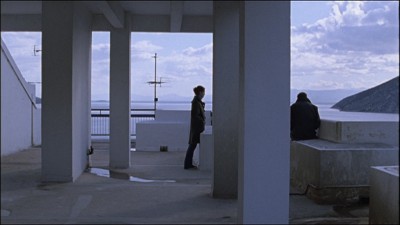
THE DVD:
A wisely sparing use of digital noise reduction means that Thimios Bakatakis's cool but gorgeous lighting, working in harmonious tandem with Tsangari's compositions, looks great as it shines through the fine, natural grain of celluloid; all nuances the film's use of shadow and the generally pavement-and-institutions color palette seem to be present and accounted for, and there is little aliasing and no edge enhancement to report. As usual, it doesn't make a very noticeable difference, but on principle, I'm docking the video rating a half-point for my only complaint: its being presented anamorphically at a slightly cropped 1.78:1 widescreen aspect ratio rather than its original theatrical ratio (according to IMDB) of 1.85:1.
Sound:The film's very fine sound design is almost entirely free of non-diegetic sound, but this is the kind of film (like those of Bresson or Haneke) where every little noise, onscreen or off, is vital, carefully chosen and calibrated to set the emotional tone and set each scene's particular level of gravity. The disc's Dolby Digital 2.0 stereo soundtrack (in Greek with non-optional English subtitles) brings all that finely-tuned sound to your speakers perfectly, with all dialogue, music, and nonverbal sound crystal clear and fully present, with no tinniness, distortion, or imbalance whatsoever.
Extras:None.

After the recent splash of Giorgos Lanthimos's breathtaking Dogtooth, Athina Rachel Tsangari's Attenberg seconds the encouraging notion that cinematic modernism is alive, well, and thriving in Greece. The film's ostensible story is that of a young woman's struggle with her sexuality, her complicated friendship, and her father's impending death (Melissa played with tremendously self-contained grace by the film's extraordinary star, Ariane Labed), but Tsangari's cool restraint and layered sense of different, simultaneous realities amid the gentle yet ennui-inducing grind/lockstep of modern life gives the film an allegorical potential to resonate with its big themes, so ambitious they almost seem anachronistic-- things like The Way We Live Now, The Relation of Human Beings to Their World, etc. -- not just in specifically Greek terms (though the sublime concreteness and specificity of place that Tsangari achieves visually and aurally, even in the film's well-integrated fantastical moments, cannot be overstated) but in a way applicable to anyone living in any developed nation with its inexorable efficiency, sense of being cut off from the past, and niggling anonymity and dread. This impression is conveyed/shown to us by Tsangari rather than expressed as such by the characters, of course; she has all of Antonioni's sense of an overly symmetrical, alienating world that dwarfs human beings and our individual concerns and desires, however urgent they remain to us. However, though hardly effusive, she is more tender, more humane than her great Italian forebear (or her somewhat like-minded French contemporary, Catherine Breillat) in her quasi-entomological observations -- a distinction seen best in the film's seemingly casual, confident blurring of the line between realistic drama and eccentricity and/or fantasy played out with no less realism in the same alienated environment, a re-affirmation of the possibility of play and self-assertion despite it all.
Attenberg is the sort of film that is steadfastly opposed, on principle, to diminishing its broad-canvas expansiveness and serious contemplation of life and the world with any sort of sentimentality or psychologizing, yet it offers its own cold but very real, moving comfort through its unblinking view of a young person left by her father's death and her entry into adulthood to an ambivalent, indifferent world. That world is finally seen as a place where she will not only survive, but will also continue, with unspoken defiance, to experience life as a dance between hope and despair, love and loss, joy and pain, all in spite of the mechanically affectless, too-smooth backdrop against which that dance will play out, which she may have accepted and even embraced, but which will never simply internalize and blend unthinkingly into. Highly Recommended.
|
| Popular Reviews |
| Sponsored Links |
|
|
| Sponsored Links |
|
|
| Release List | Reviews | Shop | Newsletter | Forum | DVD Giveaways | Blu-Ray | Advertise |
|
Copyright 2024 DVDTalk.com All Rights Reserved. Legal Info, Privacy Policy, Terms of Use,
Manage Preferences,
Your Privacy Choices | |||||||













